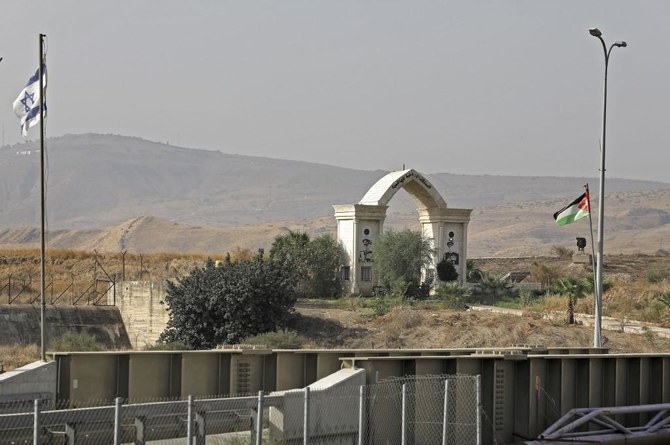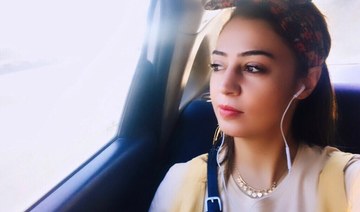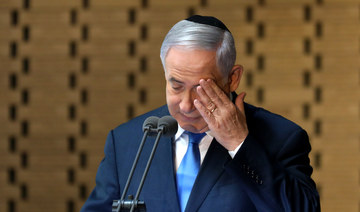NAHARAYIM PARK, Israel: The Naharayim park was established 25 years ago as a symbol of the landmark peace agreement between Israel and Jordan. Now, as the two countries mark a quarter century of official relations, the park and its “Island of Peace” are being shuttered.
It is a fitting reflection of the Israeli-Jordanian relationship — one that began with great promise, but which has been plagued by mistrust, disappointment and missed opportunities. While the peace agreement remains intact, there is a sense on both sides that it should have delivered much bigger dividends.
“I am not certain that we gave it our full attention,” said retired Supreme Court Justice Elyakim Rubinstein, who was Israel’s chief negotiator for the peace deal.
Speaking on Israeli public radio, Rubinstein said there were things Israel could do “to lend a better atmosphere” and suggested Israel show more “respect” for its eastern neighbor. He declined to elaborate.
It is a far cry from the heady times of the peace agreement, signed at an emotional ceremony on Oct. 26, 1994, attended by Israel’s then-prime minister, Yitzhak Rabin, the late King Hussein and President Bill Clinton.
Following up on a historic interim peace deal between Israel and the Palestinians a year earlier, all three leaders delivered moving speeches promising warm relations and a better future.
“This is our gift to our peoples and the generations to come,” said Hussein, who died in 1999. “It will not be simply a piece of paper ratified by those responsible, blessed by the world. It will be real, as we open our hearts and minds to each other.”
Twenty-five years later, the peace agreement remains a vital strategic asset for both countries.
The deal has brought Israel much-needed quiet and a valuable partner along its longest border, while buttressing Jordan’s position as a crucial ally of the West in one of the world’s most volatile areas.
The two countries maintain close, covert security relations. Israel, a world leader in desalination, provides large quantities of water to Jordan, one of the driest countries on earth, and has agreed to sell natural gas to Jordan as well.
But the warm relations envisioned at that signing ceremony remain elusive, and in Jordan there is little public support for the agreement.
Jordan has a long list of complaints — beginning with the deep freeze in the Israeli-Palestinian peace process.
Israel captured the West Bank and east Jerusalem from Jordan in the 1967 Mideast war. Although Jordan has renounced any claims to these territories, which the Palestinians seek as parts of a future state, it retains deep connections.
A majority of Jordan’s population is believed to have Palestinian roots, and Jordan’s King Abdullah II is a strong supporter of the Palestinian cause. Without progress on the Palestinian front, Abdullah is unable — and unwilling — to warmly embrace Israel.
Israel’s policies at Jerusalem’s most sensitive holy site — a hilltop compound known to Jews as the Temple Mount and to Muslims as the Noble Sanctuary — have also put pressure on the king.
Jordan serves as custodian of the site’s Muslim shrines. During Prime Minister Benjamin Netanyahu’s term, visits to the compound by right-wing Jewish groups that want to alter its status have increased, igniting clashes with Muslim worshippers and straining relations with Jordan.
Jordan also remains bitter over a 2017 incident in which an Israeli guard at the Israeli Embassy in Amman shot and killed two Jordanians, saying one had tried to attack him with a screwdriver.
Netanyahu gave the guard a hero’s welcome, infuriating the Jordanians. Diplomatic relations were repaired only months later after Israel expressed “deep regret” and replaced its ambassador.
More recently, Netanyahu angered Jordan by vowing to annex the Jordan Valley — a strategic area of the West Bank along the Jordanian border.
“There is no real social and popular peace between Jordan and Israel,” said Amer Sabaileh, an independent Jordanian analyst.
He said Jordan needs “more understanding from the Israeli side” and that Israel’s approach to various issues has “put Jordan in a very difficult situation.”
Speaking at a Tel Aviv conference last month, Israel’s ambassador to Jordan, Amir Weissbrod, acknowledged that relations aren’t perfect.
But he listed a long line of successes, including the water and energy cooperation, Jordan’s use of Israel’s Haifa port and an expanding program that allows hundreds of Jordanians to enter Israeli border towns to work.
Describing Jordan as a “strategic partner” and gateway to the broader Arab world, Weissbrod said: “We must try to make the utmost effort to ensure the stability and success of Jordan.”
Yet he also said there is more that Jordanian leaders could do, particularly in terms of building support among the Jordanian public.
“They can’t hide the degree of the relationship, and there are achievements to talk about,” he said.
Jordanian officials did not respond to a request for comment.
Against this backdrop, Jordan last year announced that it was ending a special lease agreement under the 1994 treaty that returned two farming areas — Naharayim and Tzofar — to Jordanian sovereignty while allowing Israel continued use of the lands. Without Jordanian objections, the leases for the areas, known in Arabic as Baqura and Ghamr, would have automatically renewed.
Naharayim, located along the Jordan River in northern Israel, has become a popular tourist site. It includes a small park and picnic area, the ruins of a historic power station and the “Island of Peace,” where Israelis can briefly enter Jordanian territory without having to show their passports.
“We regard this place as part of a normalization and relationship with our neighbors from the other side of the border,” said Idan Grinbaum, head of the local regional council. He said he has sent a letter to Abdullah asking the king to reconsider but has not heard back.
The site has a painful history. In 1997, a Jordanian soldier opened fire at an Israeli crowd, killing seven schoolgirls on a class trip.
After the shooting, King Hussein traveled to Israel to ask forgiveness from the girls’ families. Twenty years after his death, Hussein remains a beloved figure in Israel for what was seen as a courageous act.
With the site set to revert to full Jordanian control in early November, Grinbaum said he still hopes that leaders can find a way to preserve Naharayim as a symbol of peace.
“We still think that joint projects can happen here for both countries, for the benefit of citizens in both countries,” he said. “Unfortunately, in reality things are not that simple.”
Israel, Jordan mark 25 years of imperfect peace
Israel, Jordan mark 25 years of imperfect peace

- The peace agreement was signed in 1994
- It happened a year after the interim peace deal between Palestinians and Israelis
Gaza baby rescued from dead mother’s womb dies

- Doctors were able to save the baby, delivering her by Caesarean section
- The baby suffered respiratory problems and a weak immune system, said Doctor Mohammad Salama who had been caring for Sabreen Al-Rouh
RAFAH, Gaza Strip: A baby girl who was delivered from her dying mother’s womb in a Gaza hospital following an Israeli airstrike has herself died after just a few days of life, the doctor who was caring for her said on Friday.
The baby had been named Sabreen Al-Rouh. The second name means “soul” in Arabic.
Her mother, Sabreen Al-Sakani (al-Sheikh), was seriously injured when the Israeli strike hit the family home in Rafah, the southernmost city in the besieged Gaza Strip, on Saturday night.
Her husband Shukri and their three-year-old daughter Malak were killed.
Sabreen Al-Rouh, who was 30-weeks pregnant, was rushed to the Emirati hospital in Rafah. She died of her wounds, but doctors were able to save the baby, delivering her by Caesarean section.
However, the baby suffered respiratory problems and a weak immune system, said Doctor Mohammad Salama, head of the emergency neo-natal unit at Emirati Hospital, who had been caring for Sabreen Al-Rouh.
She died on Thursday and her tiny body was buried in a sandy graveyard in Rafah.
“I and other doctors tried to save her, but she died. For me personally, it was a very difficult and painful day,” he told Reuters by phone.
“She was born while her respiratory system wasn’t mature, and her immune system was very weak and that is what led to her death. She joined her family as a martyr,” Salama said.
More than 34,000 Palestinians, many of them women and children, have been killed in the six-month-old war in Gaza between Israel and Hamas militants, according to the Gaza health ministry. Israel denies deliberately targeting civilians in its campaign to eradicate Hamas.
Much of Gaza has been laid to waste by Israeli bombardments and most of the enclave’s hospitals have been badly damaged, while those still operating are short of electricity, medicine sterilization equipment and other supplies.
“(Sabreen Al-Rouh’s) grandmother urged me and the doctors to take care of her because she would be someone that would keep the memory of her mother, father and sister alive, but it was God’s will that she died,” Salama said.
Her uncle, Rami Al-Sheikh Jouda, sat by her grave on Friday lamenting the loss of the infant and the others in the family.
He said he had visited the hospital every day to check on Sabreen Al-Rouh’s health. Doctors told him she had a respiratory problem but he did not think it was bad until he got a call from the hospital telling him the baby had died.
“Rouh is gone, my brother, his wife and daughter are gone, his brother-in-law and the house that used to bring us together are gone,” he told Reuters.
“We are left with no memories of my brother, his daughter, or his wife. Everything was gone, even their pictures, their mobile phones, we couldn’t find them,” the uncle said.
UN denounces ‘more serious’ Iran crackdown on women without veils

- Hundreds of businesses including restaurants and cafes have been shut down for not enforcing the hijab rule
- More women began refusing the veil in the wake of the 2022 death in custody of 22-year-old Mahsa Amini
GENEVA: The United Nations said Friday that it was concerned by reports of new efforts to track and punish Iranian women, some as young as 15, who refuse to wear the headscarf required under the country’s Islamic law.
The UN Human Rights Office also expressed alarm about a draft bill on “Supporting the Family by Promoting the Culture of Chastity and Hijab,” which would impose tougher sentences on women appearing in public without the hijab.
“What we have seen, what we’re hearing is, in the past months, that the authorities, whether they be plainclothes police or policemen in uniform, are increasingly enforcing the hijab bill,” Jeremy Laurence, a spokesman for the office, said at a press conference.
“There have been reports of widespread arrests and harassment of women and girls — many between the ages of 15 and 17,” he said.
Iranian police announced in mid-April reinforced checks on hijab use, saying the law was increasingly being flouted.
Hundreds of businesses including restaurants and cafes have been shut down for not enforcing the hijab rule, and surveillance cameras are being used to identify women without it, Laurence said.
More women began refusing the veil in the wake of the 2022 death in custody of 22-year-old Mahsa Amini after her arrest by Iran’s morality police for allegedly breaking the headscarf law, which sparked a wave of deadly protests against the government.
Laurence said that on April 21, “the Tehran head of the Islamic Revolutionary Guard Corps announced the creation of a new body to enforce existing mandatory hijab laws, adding that guard members have been trained to do so ‘in a more serious manner’ in public spaces.”
And while the latest draft of the new hijab bill has not been released, “an earlier version stipulates that those found guilty of violating the mandatory dress code could face up to 10 years’ imprisonment, flogging, and fines,” he said, adding that “this bill must be shelved.”
The Human Rights Office also called for the release of a rapper sentenced to death for supporting nationwide protests sparked by Amini’s death.
Toomaj Salehi, 33, was arrested in October 2022 for publicly backing the uprising.
“All individuals imprisoned for exercising their freedom of opinion and expression, including artistic expression, must be released,” Laurence said.
UN seeks to deescalate Sudan tensions amid reports of possible attack

- UN Secretary-General Antonio Guterres’ envoy is engaging with all parties to deescalate tensions
UNITED NATIONS: The United Nations is increasingly concerned about escalating tensions in Al-Fashir in Sudan’s North Dafur region amid reports that the Rapid Support Forces are encircling the city, signaling a possible imminent attack, the UN’s spokesperson said on Friday.
UN Secretary-General Antonio Guterres’ envoy is engaging with all parties to deescalate tensions in the area, the spokesperson said.
Israeli army says missile fire kills civilian near Lebanon

- The violence has fueled fears of all-out conflict between Iran-backed Hezbollah and Israel
- “Overnight, terrorists fired anti-tank missiles toward the area of Har Dov in northern Israel,” the Israeli army said
JERUSALEM: The Israeli army said Friday a civilian was killed near the country’s northern border with Lebanon, as near-daily exchanges of fire with Hezbollah rage.
Both sides have stepped up attacks this week, with Hezbollah increasing rocket fire and Israel saying it had carried out “offensive action” across southern Lebanon.
The violence has fueled fears of all-out conflict between Iran-backed Hezbollah and Israel, which last went to war in 2006.
“Overnight, terrorists fired anti-tank missiles toward the area of Har Dov in northern Israel,” the Israeli army said, referring to the disputed Shebaa Farms district.
“As a result, an Israeli civilian doing infrastructure work was injured and he was later pronounced dead.”
Israeli media reported that the victim was an Arab-Israeli truck driver. Police told AFP they had not identified the body, but said it was the only one found after a truck was hit.
Hezbollah said it had destroyed two Israeli vehicles in the Kfarshuba hills overnight in a “complex ambush” on a convoy using missiles and artillery.
The Israeli army did not comment directly on the claim.
It said Israeli fighter jets struck Hezbollah targets around Shebaa village in southern Lebanon including a weapons store and a launcher, while soldiers “fired to remove a threat in the area.”
It said fighter jets also “struck Hezbollah operational infrastructure in the area of Kfarshuba and a military compound in the area of Ain El Tineh in southern Lebanon.”
Lebanon’s official National News Agency reported that Shebaa village, Kfarshuba and Helta were targeted by “more than 150 Israeli shells,” leaving homes damaged.
Iran-backed Hezbollah has been trading almost-daily fire with the Israeli army since the day after its Palestinian ally Hamas carried out an unprecedented attack on Israel on October 7.
Since October 8 at least 380 people have been killed in Lebanon, including 252 Hezbollah fighters and dozens of civilians, according to an AFP tally.
Israel says 11 soldiers and nine civilians have been killed on its side of the border.
Tens of thousands of people have been displaced on both sides.
EU commits $73 million more for Gaza aid

- New EU aid would be focused on food deliveries, clean water, sanitation and shelters
- The EU and United States have demanded that Israel allows more aid into Gaza
BRUSSELS: The European Union on Friday said it was giving an extra 68 million euros ($73 million) to provide desperately needed aid to Palestinians in Gaza.
The territory has been devastated by more than six months of Israeli bombardment and ground operations after Hamas’s October 7 attack, leaving the civilian population of two million people in need of humanitarian assistance to survive.
“In light of the continued deterioration of the severe humanitarian crisis in Gaza, and the steady rise of needs on the ground, the (European) Commission is stepping up its funding to support Palestinians affected by the ongoing war,” an EU statement said.
“This support brings total EU humanitarian assistance to 193 million euros for Palestinians in need inside Gaza and across the region in 2024.”
The EU said the new aid would be focused on food deliveries, clean water, sanitation and shelters, and would be channelled through local partners on the ground.
The United Nations has said Israel’s operation has turned Gaza into a “humanitarian hellscape,” amid fears of a looming famine.
The EU and United States have demanded that Israel allows more aid into Gaza.
The US military said on Thursday it had begun construction of a pier meant to boost deliveries to the territory.
The war in Gaza began with an unprecedented Hamas attack on Israel on October 7 that resulted in the deaths of about 1,170 people in Israel, according to an AFP tally of Israeli official figures.
Israel vowed to destroy Hamas, with a retaliatory offensive that has killed at least 34,356 people in Gaza, mostly women and children, according to the Hamas-run territory’s health ministry.






















